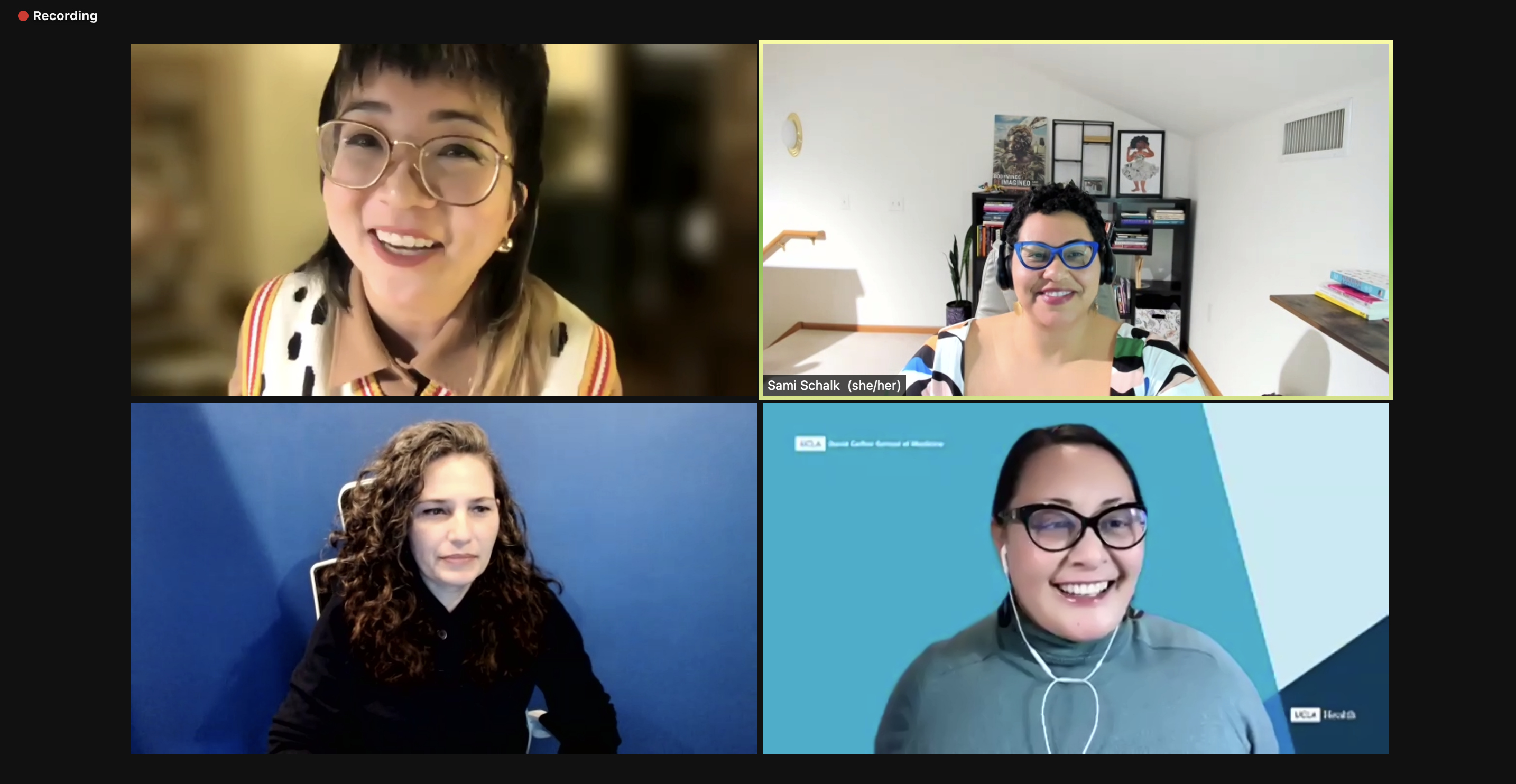UCLA’s Disabilities Studies Inclusion Labs Explores the Future of Disability in Academia

Image Description: Four individuals are featured on a zoom call. They are smiling. The individual in the upper right hand corner is highlighted, with her name and pronouns (“Sami Schalk (she/her)”) listed in the corner of her screen.
Since its introduction in 2007, UCLA’s disability studies minor has worked to broaden students’ and faculty members’ understanding of disability across multiple disciplines. Bruins involved in the minor are empowered with the knowledge and skills necessary to evolve and expand the growing field.
The Disability Studies Inclusion Labs debuted in 2018 as an adjunct to the minor program, providing UCLA community members with space to explore their responsibility in advocating for an equitable and inclusive campus. In conversation with esteemed scholars, leaders, and activists in the field, students are encouraged to consider their individual contributions to disability justice and rectify a broad spectrum of social dilemmas affecting the lived experiences of people with disabilities.
On Jan. 19, the Disabilities Studies Inclusion Labs held an online panel discussion, “The Future of Disability Studies: Conversation with Sami Schalk, Jina B. Kim, and Juliann Anesi,” as a part of their ongoing webinar series “Conversations: The Future of Disability Studies.” In a Q&A style discourse, moderator Juliann Anesi posed questions to panelists Jina B. Kim and Sami Schalk, who shared their insights and experiences in disabilities studies.
“I think that we’re all interested in exploring and arguing how disability justice, politics and aesthetics are actually really key to challenging the deathbound logics of state violence, as well as the current crisis of care that has become ever more apparent with COVID,” Kim explained in her introduction. Kim is an assistant professor of English and study of women and gender at Smith College, where she approaches her teaching and writing practice from a multidimensional queer, feminist, and disabled lens.
“I’ve always tried to operate from a feminist disability pedagogy. Disability studies has always been central to how I’ve put together my classroom, but I feel that has become all the more true since the beginning of the pandemic,” Kim said. “One of the major realizations I had was that I don’t want to train students to be good workers under capitalism. I’m more interested in creating a supportive space for nurturing students into their freedom, however they understand or define freedom.”
Kim is currently working to complete her book manuscript “Dreaming of Infrastructure: Crip-of-Color Imaginaries after the U.S. Welfare State,” which analyzes the literary and cultural contributions of women and queer people of color following the 1996 U.S. Welfare Reform Act.
Adjacent to Kim’s screen, Schalk is a gender and women’s studies associate professor at the University of Wisconsin-Madison, where her research examines the intersection of disability, race, and gender in the United States. A published author, Schalk’s works include “Bodyminds Reimagined: (Dis)ability, Race, and Gender in Black Women’s Speculative Fiction” (2018) and forthcoming “Black Disability Politics” (2022).
The motivation that propels Schalk’s work originates from a personal dissatisfaction with the noninclusive practices and ideologies historically widespread in “white disabilities studies” and education. Schalk’s writing honors the histories of Black disabilities activists and shifts conversations surrounding disability justice to recognize the experiences of the Black disabled community.
“I want to talk to black folks about how and why we need to be thinking about disability and theorizing from our own places of Black disability.” Schalk explained.
Schalk’s undertaking is a reminder of the importance of centering intersectionality across all academic disciplines. Through the contributions of queer, feminist, people of color with disabilities, the field is able to broaden the scope of its social impact and unveil issues of injustice affecting marginalized communities.
Growing calls for a disabilities studies major program have become increasingly amplified at UCLA and universities across the nation. In the meantime, students and faculty can anticipate a more inclusive and interdisciplinary academic environment as the minor continues to pique interest among UCLA undergraduates from diverse academic backgrounds.
“There’s so many folks picking up a minor or major alongside something else that allows them to go in the world differently as a professional. I love when I have pre-nursing or pre-med students,” Schalk said. “It’s exciting to me to think they’ll have a slightly different lens before they go into med school, or they may get a day thinking about people with disability from a more critical and humanist perspective.”
Students interested in learning more about disabilities studies education at UCLA are encouraged to register for classes offered within the minor. Anesi, who is an assistant professor of gender studies and member of the disabilities studies faculty advisory committee at UCLA, will pilot a new seminar course entitled “Disability, Indigeneity and COVID” in spring quarter 2022. Other disabilities studies coursework include internship experience and capstone seminars.
A recording of “The Future of Disability Studies: Conversation with Sami Schalk, Jina B. Kim, and Juliann Anesi” can be found on the UCLA Disabilities Studies Youtube channel. Additionally, more information regarding the Disability Studies Inclusion Labs and their previous, ongoing, and upcoming programs can be found on their website.




